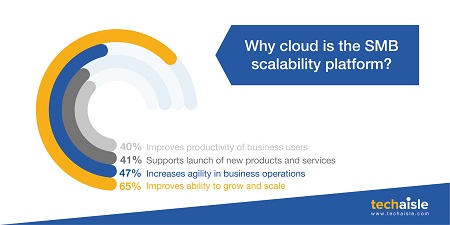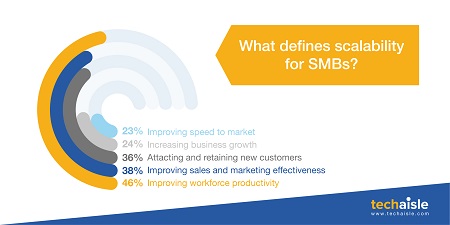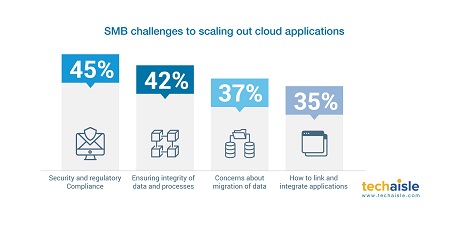Every business is looking to build scalability into its operations. In IT terms, scalability is often tightly defined in terms of the potential to add capacity to specific system. This is part of the answer – but from an SMB perspective, scalability centers on the ability to increase the impact of each employee: by increasing productivity by delivering new functionality, new systems, and more capacity as needed. Techaisle’s SMB and Midmarket cloud adoption survey research shows that SMBs view cloud as the primary platform for scaling their IT systems – and their businesses. Techaisle global survey of over N=5000 SMBs discovered close connections between cloud and key business objectives:
● 65% of SMBs believe that cloud improves their ability to grow and scale their businesses
● 47% see cloud as a means of increasing agility in business operations – a core requirement for growth-oriented SMBs
● 41% state that cloud allows them to launch new products and services more quickly
● 40% report that cloud-based systems improve the productivity of business users.
It is no accident that 91% of SMBs (Source: 2020 Techaisle US SMB and Midmarket Cloud Adoption survey) are using cloud applications today, and 83% state that their businesses rely on technology. Cloud is the platform for small and midmarket businesses, and effective use of cloud is a key element in SMB viability. Similarly, 2020 Techaisle Europe SMB and Midmarket Cloud adoption survey data shows that 87% of SMBs are using cloud.

In the world inhabited by SMB owners and executives, ‘scalability’ is a critical factor in business viability and success. SMBs do not have the resources – capital or human – to invest in capabilities before they are needed; they thrive on agility, the ability to respond to new opportunities as and where they arise.
As SMBs mature they face a set of connected challenges: the need to continue to deliver to existing customers while developing new opportunities, the need to align resources with immediate needs, flexibly, and in response to shifting priorities and the need to build staff incrementally, and to ensure that each staff member is connected to the legacy business and equipped to meet new requirements. These are daunting challenges…but they are not necessarily hard constraints. SMBs that use technology to scale their operations can break down barriers to growth, ensuring that each new capability is additive, and that each new resource can contribute meaningfully to an expanded vision of success.
What defines scalability for SMBs?
From an IT perspective, scalability is generally used to describe systems that can handle increasing numbers of users – and while this is part of what businesspeople mean when they look at scalability, it is only one of several related issues. Findings from a global research study of more than 5,000 SMBs conducted by Techaisle finds that five issues define scalability for small and midmarket firms. They include:
- Improving workforce productivity: Lacking the ability to invest ahead of revenue, SMBs need to ensure that the cost of new resources is less than the value of new services delivered – which means, in most cases, that the SMB needs to ramp up productivity so that revenue growth increases faster than staff expense.
- Improving the effectiveness of sales and marketing: Go-to-market is an area where technology is enabling much more efficient and effective processes. CRM (Customer Relationship Management) systems connected to marketing automation provide SMBs with the ability to generate, track and close opportunities more quickly, while also improving forecasting and establishing investment priorities within the business.
- Attracting and retaining new customers: Enterprises with enormous customer rosters can profit for years by simply introducing upgrades or new products targeted at existing customers. SMBs don’t have that luxury: to scale, they need to attract new clients, while ensuring that customer churn doesn’t negatively impact the overall client base.
- Improving speed to market: SMBs generally have an agility advantage over enterprises – an ability to move quickly to capitalize on new customer requests. But with limited resources and competing demands, SMBs also have a limited capacity for developing and delivering new offerings. How can technology accelerate the SMB’s ‘ideation to execution’ cycle?
- Increasing business growth: One of the challenges of scaling up a small business is juggling ongoing requirements and new opportunities. The technologies used to support improved productivity and new market penetration need to connect to each other to provide a platform for ongoing success

Challenges to scaling cloud
Momentum towards scalable solutions is strong but SMBs proceeding down the scalable market-facing systems face potential barriers to success in this journey, in order to build approaches that deliver best time-to-benefit and returns on their cloud solution investments.
SMBs surveyed by Techaisle identified four challenges to scaling out cloud applications. Nearly half worry about security and regulatory compliance. Just over 40% of respondents reported that they view “ensuring integrity of data and processes” as an obstacle to accelerating cloud business application adoption; 37% report that they have concerns about data migration, and 35% are unsure how they will link and integrate applications.

Each of these is certainly a legitimate issue. However, each of the four is or can be addressed within current cloud software frameworks (topic for another discussion). Technology is critical to SMB scalability – but to be a full contributor to success, SMB IT leaders, channel partners and IT suppliers need to align their perspectives on scalability with SMB business imperatives and priorities.